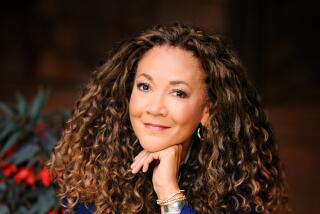Biblical Scholars With a Black Viewpoint
- Share via
When New Testament scholars talk about slavery, the tiny book of Philemon--a one-chapter book traditionally read as the Apostle Paul’s note accompanying the return of a slave to his owner--is their definitive text.
But Allen Callahan, an African American Bible scholar, believes that the text is not even about slavery. In his view, it is about reconciliation and the slave language is metaphorical, making the book a story about how Paul tried to heal a relationship between two brothers.
Callahan attributes his unique perspective on the book in part to his “social location,” not least of which is the fact that he is African American.
“When I look at [Philemon] that way, all kinds of possibilities, helpful possibilities, about reconciliation arise,” he said. “If I were writing from another social location, I wouldn’t be as sensitive to that.”
Callahan, an associate professor of the New Testament at Harvard Divinity School, is one of a small number of African Americans with doctoral degrees in biblical studies who are bringing fresh interpretations to texts long read through white and Western eyes.
And their ranks are slowly growing, thanks to efforts by established scholars to recruit talented young people into the difficult and sometimes arcane field and to mentor graduate students.
Biblical studies, Callahan said, is the final frontier of African American scholarly influence in the field of religion, something of an ironic situation for an African American church community so grounded in the biblical narratives.
Although some students take for granted their opportunity to integrate their experience with their studies, cultural relevance is only one aspect of the scholarly work of these African Americans.
“[Relevance] is big for the black church, which sees these persons as resources,” said Stephen Reid, associate professor of Old Testament studies at Austin Presbyterian Theological Seminary in Texas. “It is big for white liberals who assume that we can do nothing else. For us, it’s just a part of the work. It’s not all the work.”
Judy Fentress-Williams, who is finishing her doctorate at Hartford Seminary in Connecticut, said the pioneering work of other African American scholars has made it easier for young scholars like herself to approach Scripture without having to focus exclusively on black issues.
Like many people, a love of the Hebrew language drew Fentress-Williams into the study of Scripture. She is interested in literary approaches to the Bible and feels that the growing number of African American biblical scholars helps make it easier for her to pursue that area of research. Scholars no longer feel boxed in by the expectation that they would concentrate solely on black issues.
“The more diversity there is, the better it is for everyone,” Fentress-Williams said.
More to Read
Sign up for Essential California
The most important California stories and recommendations in your inbox every morning.
You may occasionally receive promotional content from the Los Angeles Times.













